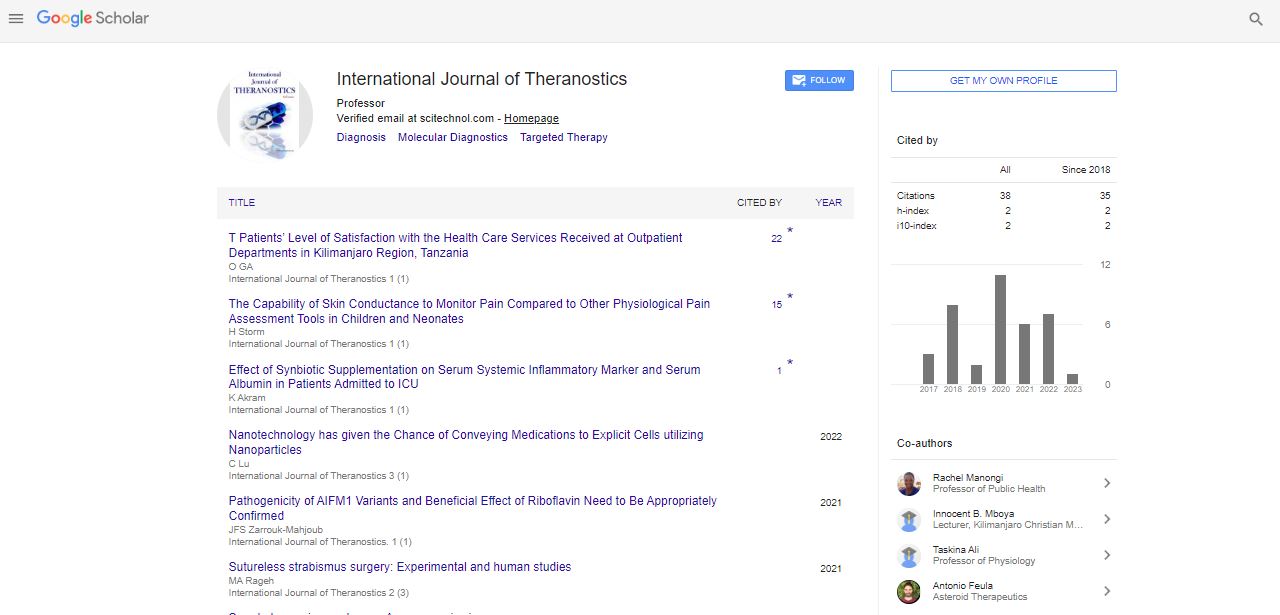Perspective, Int J Theranostic Vol: 12 Issue: 1
An Overview on Molecular diagnostic Tests and it Advantages
Stephanie Conrad*
Department of Clinical Pathology, Tufts University School of Medicine, Boston, USA
*Corresponding Author: Stephanie Conrad
Department of Clinical Pathology, Tufts
University School of Medicine, Boston, USA
E-mail: conard_Stephanie@center.edu
Received date: 03-Feb-2023, Manuscript No. IJT-23-95553;
Editor assigned date: 06-Feb-2023, PreQC No. IJT-23-95553 (PQ);
Reviewed date: 20-Feb-2023, QC No IJT-23-95553;
Revised date: 27-Feb-2023, Manuscript No. IJT-23-95553 (R);
Published date: 07-Mar-2023 DOI: 10.4172/IJT.100124.
Citation: Conrad S (2023) An Overview on Molecular Diagnostic Tests and it Advantages. Int J Theranostic 12:1.
Keywords: Diagnosis, Image-guided Therapy, Molecular Diagnostics
Description
Molecular diagnostics is a rapidly growing field of medicine that utilizes molecular biology techniques to detect and diagnose diseases at the genetic or molecular level. This is a branch of laboratory medicine that analyzes biological markers in the body such as DNA, RNA, proteins, and metabolites, to provide clinicians with precise and accurate information on the presence, severity, and progression of a disease.
Molecular diagnostic tests are used in the clinical setting to diagnose and monitor a range of conditions, including infectious diseases, genetic disorders, and cancers. These tests can help healthcare professionals make informed treatment decisions, predict disease progression, and personalize patient care.
There are several types of molecular diagnostic tests available, including nucleic acid-based tests, protein-based tests, and metabolitebased tests. Nucleic acid-based tests are the most common type of molecular diagnostic test and involve the detection of DNA or RNA sequences in a patient's sample. These tests can detect the presence of specific pathogens, such as bacteria, viruses, or fungi, and can also identify genetic mutations associated with inherited disorders or cancer.
Protein-based tests, on the other hand, detect specific proteins in a patient's sample. These tests are commonly used to diagnose and monitor cancer, as well as other conditions such as heart disease and autoimmune disorders. Metabolite-based tests analyze the levels of small molecules, known as metabolites, in a patient's sample to diagnose or monitor diseases such as diabetes and metabolic disorders.
One of the main advantages of molecular diagnostic testing is its high sensitivity and specificity. This means that the tests can accurately detect very small amounts of DNA, RNA, or protein in a patient's sample, even in the early stages of a disease. This early detection can lead to earlier treatment, which can improve patient outcomes and reduce healthcare costs.
Molecular diagnostic testing has revolutionized the diagnosis and management of infectious diseases. Traditional methods of identifying pathogens, such as culturing samples and observing growth, can take several days or even weeks. Molecular diagnostic tests, however, can identify specific DNA or RNA sequences of the pathogen in just a few hours, allowing for rapid and accurate diagnosis. This can help healthcare professionals to select the most appropriate treatment and minimize the spread of infection.
In addition to infectious diseases, molecular diagnostic testing is also commonly used in the diagnosis and management of genetic disorders. These tests can detect mutations in genes that are associated with inherited diseases, such as cystic fibrosis, sickle cell anemia, and Huntington's disease. The ability to diagnose these conditions at an early age can allow for earlier treatment and management, which can improve patient outcomes.
Molecular diagnostic testing is also playing an important role in the diagnosis and management of cancer. These tests can identify specific genetic mutations that are associated with certain types of cancer, allowing for earlier detection and more targeted treatment. For example, the identification of the BRCA1 and BRCA2 mutations can help identify individuals who are at increased risk for breast and ovarian cancer and allow for earlier screening and preventative measures.
 Spanish
Spanish  Chinese
Chinese  Russian
Russian  German
German  French
French  Japanese
Japanese  Portuguese
Portuguese  Hindi
Hindi 